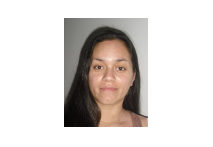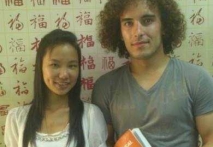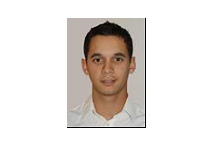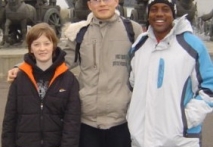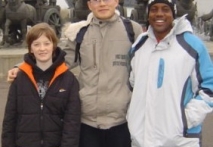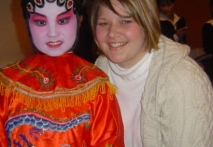学习心得
语风汉语学生Jennifer
学习心得
语风汉语学生Jennifer
我叫Jennifer,我非常喜欢在语风汉语无锡校学习汉语,这是一个非常好的学...
语风汉语无锡校 Zack
学习心得
语风汉语无锡校 Zack
我叫Zack,我是法国人,无锡语风汉教中心是一个学习中国文化和对外汉语的好...
语风汉语学生Kevin
学习心得
语风汉语学生Kevin
语风汉语是一个最理想的学习汉语和中国文化的好地方,学校给我们提供了很多...
语风汉语学生Florent
学习心得
语风汉语学生Florent
我非常喜欢无锡语风汉语学校,这里真的有最简单的汉语学习方法,我学习汉...
语风汉语学生Brad
学习心得
语风汉语学生Brad
我叫Brad,我是澳大利亚人,我再语风汉语学校学习汉语。我现在可以独立和我的...
语风汉语我的无锡学习汉语之路
学习心得
语风汉语我的无锡学习汉语之路
Cherry Queen 中文名: 钱沫以 &nbs...
无锡语风汉语优秀汉语学生Victoria
学习心得
无锡语风汉语优秀汉语学生Victoria
维多利亚Victoria,来自德国的一位11岁的小女孩 ,现读于语...
无锡语风汉语外国学生Michael的汉语学习之路
学习心得
无锡语风汉语外国学生Michael的汉语学习之路
Michael 刚刚来我们无锡语风汉语学校不久的美国学...
苏州汉语学生Jude
学习心得
苏州汉语学生Jude
我叫Jude,在苏州语风汉语学校学习汉语,我也在无锡语风汉语学校学习过很长时间...
无锡语风汉语学校Jessie
学习心得
无锡语风汉语学校Jessie
我学习汉语已经八年了,我能听明白别人说汉语,但是我自己说汉语却觉得说...
汉语 加官方
关注了解更多对外汉语资讯

0510-81151808
1866 1199 988
Sandy.Swun
519988808
无锡新区长江一号 茂业
深茂商务中心8号楼405室
无锡语风学校
语风汉语教学中心
无锡语风国际教育交流中心
Wuxi Mandarin Education School
Learning Chinese changes young lives
By DONG LESHUO and MAY ZHOU in Atlanta(China Daily USA)
From left, Jeff Wang, director of China learning initiatives at Asia Society, moderates the talk on Chinese learning experiences by panelists Kara Babb, Nathan Bueachamp-Mustafaga, Jeff Kellogg, Maeusz Naslonski, Clarissa Shah and Ashley Tolbert on Apr 17 in Atlanta. MAY ZHOU / CHINA DAILY
American young people shared their experiences of Chinese learning at the 8th National Chinese Language Conference on April 17 in Atlanta.
"This conference is designed to demonstrate how language learning can provide multiple ways of global engagement, how language learning leads ordinary students to amazing careers and lives," said Jeff Wang, director of China Learning initiatives of the Asia Society.
Nathan Beauchamp-Mustafaga of Washington, DC made up his mind to learn Chinese as a foreign language over other languages when he was 12.
Now Beauchamp-Mustafaga is the editor of China Brief. He was selected as one of the Under 25 top rising scholars on US-China relations by Yale University's China Hands magazine.
"Chinese has given me passion. It is very fundamental part of my life," he said.
Kara Babb, who works for Amazon in Seattle, has been learning Chinese for five years.
Babb's major in college is international business. When her professor suggested she learn Chinese as a foreign language, she thought it was a mission impossible.
"I thought it was pretty difficult. When I look at the characters for the first time I thought I can't do this," Babb said.
However, by working hard and keeping at it every day, she now speaks fluent Mandarin.
"What Chinese is for me is giving me confidence that there is nothing I can't do," Babb said. "It's this kind of attitude that got me a job at Amazon that I had no experience for. Learning Chinese helped build my confidence. "
Mateusz Naslonski heard Chinese for the first time watching the movie Rush Hour as a freshman in high school.
"I thought it was really cool pronunciation," he said. Then he started his journey with learning Chinese, which opened the door to his future. As a sophomore at Georgetown, he decided, besides majoring in Chinese, he would also learn Korean. "I want to compare different East Asian cultures to gain better understanding of Asia."
Attorney Clarissa Shah experienced frustration in the very beginning, as her parents did not agree with her when she decided to learn Chinese in college.
"But I insisted on learning Chinese and my parents are very happy with what I have achieved now," Shah said.
Shah found out that speaking the language was really helpful to "engage in genuine conversations".
Jeff Kellogg, who has been learning Chinese for nine years, "wasn't thinking of continuing to learn Chinese from the start".
Now Kellogg has been using his Chinese skill to grow his own travel business. "I want Chinese visitors to the US to be moved by their experiences here as I was in China," said Kellogg.
The panelists also shared some personal insights. For Beauchamp-Mustafaga, "my best moments would be Christmas spent on Everest and my visits to Tibet and Xinjiang. When one gets outside of major cities like Beijing and Shanghai and explores further, one gets a sense of the fuller picture of China."
"In 2013 I lived in China for a few months. It was a cool and eye-opening experience," said Ashley Tolbert, whose Chinese name is Aisha.
"One time I volunteered at a rural school outside of Beijing, I was talking to people there about the difference in education between urban and rural areas. The fact that I could carry a meaningful conversation in Chinese blew my mind away," said Tolbert.
Naslonski thinks that studying Chinese is a process that takes time. He thinks Chinese grammar is difficult.
"Tone is one thing, intonation, pronunciation, is hard," said Kellogg. "But you shouldn't be discouraged by this. It's truly possible."
"Chinese is difficult but if you are excited about it and continue to keep that drive, it is not a hard as you thought," Shah said.
The panelists were all grateful to their teachers.
"It was encouragement from my Chinese teacher that made things easier," Beauchamp-Mustafaga said.
"I want to thank my Chinese teacher, Heidi Steele. She is so persistent that she will not give up on you," Kellogg said.
Naslonski described his Chinese teacher as "an excellent educator". "She is my friend. I can go straight into her office anytime," he said.
Moderator Jeff Wang pointed out that all the participants showed curiosity, passion and gained confidence and friendship along the way in learning Chinese. "This is what we called global engagement," said Wang.
By DONG LESHUO and MAY ZHOU in Atlanta(China Daily USA)
From left, Jeff Wang, director of China learning initiatives at Asia Society, moderates the talk on Chinese learning experiences by panelists Kara Babb, Nathan Bueachamp-Mustafaga, Jeff Kellogg, Maeusz Naslonski, Clarissa Shah and Ashley Tolbert on Apr 17 in Atlanta. MAY ZHOU / CHINA DAILY
American young people shared their experiences of Chinese learning at the 8th National Chinese Language Conference on April 17 in Atlanta.
"This conference is designed to demonstrate how language learning can provide multiple ways of global engagement, how language learning leads ordinary students to amazing careers and lives," said Jeff Wang, director of China Learning initiatives of the Asia Society.
Nathan Beauchamp-Mustafaga of Washington, DC made up his mind to learn Chinese as a foreign language over other languages when he was 12.
Now Beauchamp-Mustafaga is the editor of China Brief. He was selected as one of the Under 25 top rising scholars on US-China relations by Yale University's China Hands magazine.
"Chinese has given me passion. It is very fundamental part of my life," he said.
Kara Babb, who works for Amazon in Seattle, has been learning Chinese for five years.
Babb's major in college is international business. When her professor suggested she learn Chinese as a foreign language, she thought it was a mission impossible.
"I thought it was pretty difficult. When I look at the characters for the first time I thought I can't do this," Babb said.
However, by working hard and keeping at it every day, she now speaks fluent Mandarin.
"What Chinese is for me is giving me confidence that there is nothing I can't do," Babb said. "It's this kind of attitude that got me a job at Amazon that I had no experience for. Learning Chinese helped build my confidence. "
Mateusz Naslonski heard Chinese for the first time watching the movie Rush Hour as a freshman in high school.
"I thought it was really cool pronunciation," he said. Then he started his journey with learning Chinese, which opened the door to his future. As a sophomore at Georgetown, he decided, besides majoring in Chinese, he would also learn Korean. "I want to compare different East Asian cultures to gain better understanding of Asia."
Attorney Clarissa Shah experienced frustration in the very beginning, as her parents did not agree with her when she decided to learn Chinese in college.
"But I insisted on learning Chinese and my parents are very happy with what I have achieved now," Shah said.
Shah found out that speaking the language was really helpful to "engage in genuine conversations".
Jeff Kellogg, who has been learning Chinese for nine years, "wasn't thinking of continuing to learn Chinese from the start".
Now Kellogg has been using his Chinese skill to grow his own travel business. "I want Chinese visitors to the US to be moved by their experiences here as I was in China," said Kellogg.
The panelists also shared some personal insights. For Beauchamp-Mustafaga, "my best moments would be Christmas spent on Everest and my visits to Tibet and Xinjiang. When one gets outside of major cities like Beijing and Shanghai and explores further, one gets a sense of the fuller picture of China."
"In 2013 I lived in China for a few months. It was a cool and eye-opening experience," said Ashley Tolbert, whose Chinese name is Aisha.
"One time I volunteered at a rural school outside of Beijing, I was talking to people there about the difference in education between urban and rural areas. The fact that I could carry a meaningful conversation in Chinese blew my mind away," said Tolbert.
Naslonski thinks that studying Chinese is a process that takes time. He thinks Chinese grammar is difficult.
"Tone is one thing, intonation, pronunciation, is hard," said Kellogg. "But you shouldn't be discouraged by this. It's truly possible."
"Chinese is difficult but if you are excited about it and continue to keep that drive, it is not a hard as you thought," Shah said.
The panelists were all grateful to their teachers.
"It was encouragement from my Chinese teacher that made things easier," Beauchamp-Mustafaga said.
"I want to thank my Chinese teacher, Heidi Steele. She is so persistent that she will not give up on you," Kellogg said.
Naslonski described his Chinese teacher as "an excellent educator". "She is my friend. I can go straight into her office anytime," he said.
Moderator Jeff Wang pointed out that all the participants showed curiosity, passion and gained confidence and friendship along the way in learning Chinese. "This is what we called global engagement," said Wang.
